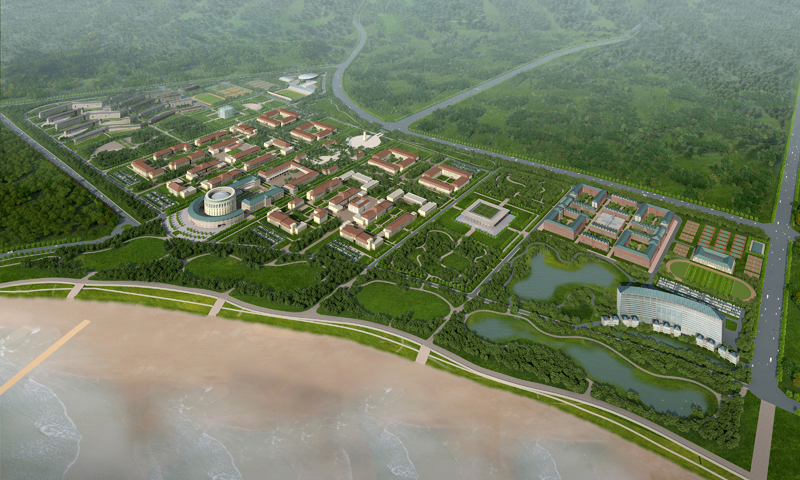The Shanghai office of international design and architecture firm Perkins Eastman joins Shandong Design Institute to announce the completion of a constructible master plan for the new Qingdao branch campus of Shandong University (SDU). Groundbreaking for the 500-acre campus is scheduled for late 2011 with project completion estimated in 2016. The 12.9 million square-foot of buildings are to be constructed in a single phase.
Shandong University’s new campus for 25,000 students is situated on the Yellow Sea overlooking Aoshan Bay near the city of Qingdao. The campus is designed to expand Shandong University’s international presence by providing world-class teaching, living, and research and development facilities. An International Conference Center will provide a first-rate destination for international cooperation and sharing of information. A theater and museum will serve as resources for the local Qingdao community, and will house within a permanent collection the History of SDU from its birth as a Christian College in 1901 to its current status as a distinguished institution for higher learning.
Chairman and CEO Bradford Perkins FAIA says of the new plan, “The original master plan for the Shandong University Medical School at Qilu, China, was designed by my grandfather Dwight Heald Perkins in 1904. It is a fitting tribute and incredibly satisfying to be a part of the future of this world-class institution.”
The campus design combines traditional and modern campus planning, landscape, and architectural features and is organized around major and minor axes. The buildings of the academic quads are typically four stories with pedestrian arcades in order to create a pedestrian-friendly environment with a walk-able scale. Residential buildings vary in height from three to six stories with integrated student centers and dining facilities--something new to Chinese university campuses. The student centers will create an environment to foster nontraditional learning through the employment of a state-of-the-art technological infrastructure that will be linked to the traditional learning centers contained within the academic quads and library.
From a sustainability perspective, the roofs of the buildings of the south campus housing were designed to accommodate solar panels. Buildings will be cooled and heated through the employment of ground source heat pumps supplying chilled water to individual fan coil units. Tidal power generation also will be used as a supplementary system. There will be a grey water treatment plant that will supply water for site irrigation and toilet flushing. Large constructed wetlands planted with native vegetation will be used for storm water management and beach and wildlife conservation. A massive green roof covers one level of below-grade parking for 1,500 cars at the main entry. BD+C
Related Stories
Adaptive Reuse | Oct 22, 2024
Adaptive reuse project transforms 1840s-era mill building into rental housing
A recently opened multifamily property in Lawrence, Mass., is an adaptive reuse of an 1840s-era mill building. Stone Mill Lofts is one of the first all-electric mixed-income multifamily properties in Massachusetts. The all-electric building meets ambitious modern energy codes and stringent National Park Service historic preservation guidelines.
MFPRO+ News | Oct 22, 2024
Project financing tempers robust demand for multifamily housing
AEC Giants with multifamily practices report that the sector has been struggling over the past year, despite the high demand for housing, especially affordable products.
Performing Arts Centers | Oct 21, 2024
The New Jersey Performing Arts Center breaks ground on $336 million redevelopment of its 12-acre campus
In Newark, N.J., the New Jersey Performing Arts Center (NJPAC) has broken grown on the three-year, $336 million redevelopment of its 12-acre campus. The project will provide downtown Newark 350 mixed-income residential units, along with shops, restaurants, outdoor gathering spaces, and an education and community center with professional rehearsal spaces.
Office Buildings | Oct 21, 2024
3 surprises impacting the return to the office
This blog series exploring Gensler's Workplace Survey shows the top three surprises uncovered in the return to the office.
Healthcare Facilities | Oct 18, 2024
7 design lessons for future-proofing academic medical centers
HOK’s Paul Strohm and Scott Rawlings and Indiana University Health’s Jim Mladucky share strategies for planning and designing academic medical centers that remain impactful for generations to come.
Sports and Recreational Facilities | Oct 17, 2024
In the NIL era, colleges and universities are stepping up their sports facilities game
NIL policies have raised expectations among student-athletes about the quality of sports training and performing facilities, in ways that present new opportunities for AEC firms.
Codes and Standards | Oct 17, 2024
Austin, Texas, adopts AI-driven building permit software
After a successful pilot program, Austin has adopted AI-driven building permit software to speed up the building permitting process.
Resiliency | Oct 17, 2024
U.S. is reducing floodplain development in most areas
The perception that the U.S. has not been able to curb development in flood-prone areas is mostly inaccurate, according to new research from climate adaptation experts. A national survey of floodplain development between 2001 and 2019 found that fewer structures were built in floodplains than might be expected if cities were building at random.
Seismic Design | Oct 17, 2024
Calif. governor signs limited extension to hospital seismic retrofit mandate
Some California hospitals will have three additional years to comply with the state’s seismic retrofit mandate, after Gov. Gavin Newsom signed a bill extending the 2030 deadline.
MFPRO+ News | Oct 16, 2024
One-third of young adults say hurricanes like Helene and Milton will impact where they choose to live
Nearly one-third of U.S. residents between 18 and 34 years old say they are reconsidering where they want to move after seeing the damage wrought by Hurricane Helene, according to a Redfin report. About 15% of those over age 35 echoed their younger cohort’s sentiment.

















